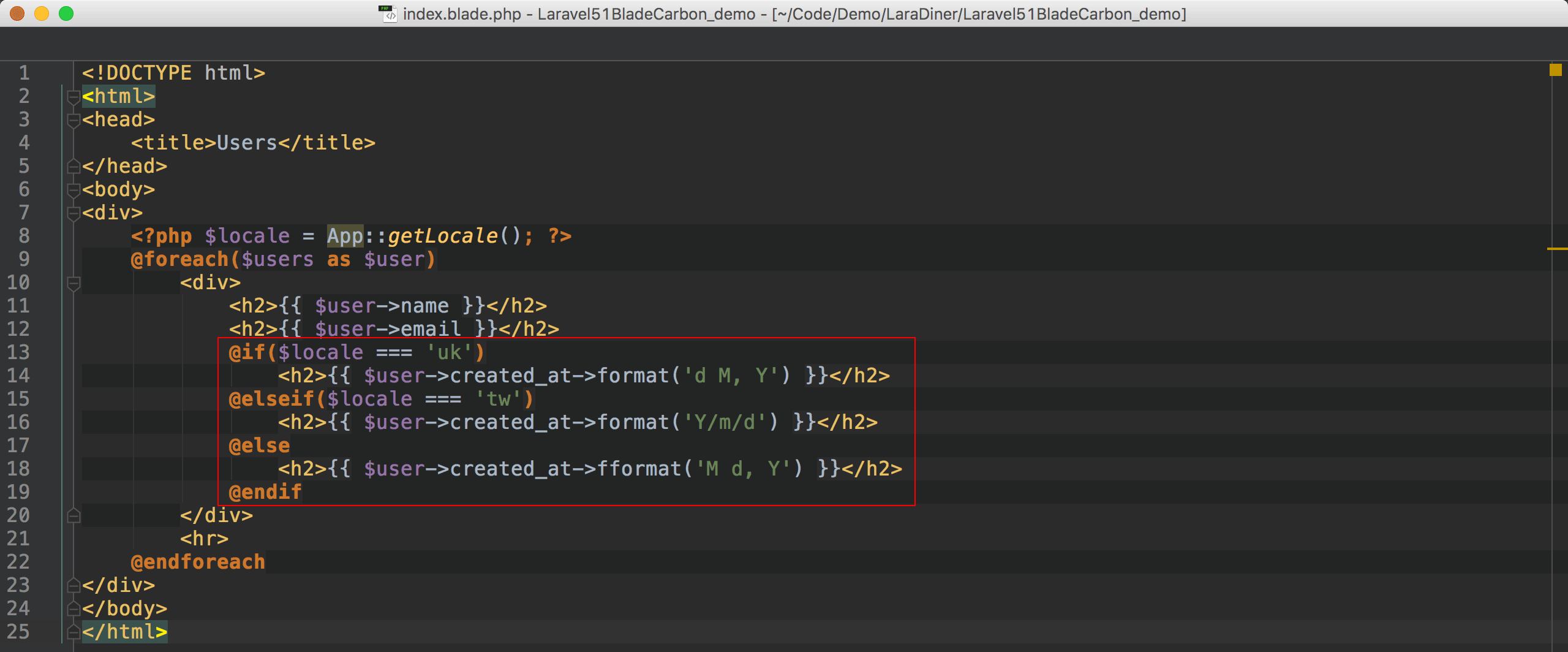如何使用 Presenter 模式 ?
若將顯示邏輯都寫在 view,會造成 view 肥大而難以維護,基於 SOLID 原則,我們應該使用 Presenter 模式輔助 view,將相關的顯示邏輯封裝在不同的 presenter,方便中大型專案的維護。
Version
Laravel 5.1.22
顯示邏輯
顯示邏輯中,常見的如 :
- 將資料顯示不同資料 : 如
性別欄位為M,就顯示Mr.,若性別欄位為F,就顯示Mrs.。 - 是否顯示某些資料 : 如
根據欄位值是否為Y,要不要顯示該欄位。 - 依需求顯示不同格式 : 如
依照不同的語系,顯示不同的日期格式。
Presenter
將資料顯示不同資料
如性別欄位為M,就顯示Mr.,若性別欄位為F,就顯示Mrs.,初學者常會直接用 blade 寫在 view。

在中大型專案,會有幾個問題 :
- 由於 blade 與 HTML 夾雜,不太適合寫太複雜的程式,只適合做一些簡單的 binding,否則很容易流於傳統 PHP 的義大利麵程式。
- 無法對顯示邏輯做重構與物件導向。
比較好的方式是使用 presenter :
- 將相依物件注入到 presenter。
- 在 presenter 內寫格式轉換。
- 將 presenter 注入到 view。
UserPresenter.php1
2
3
4
5
6
7
8
9
10
11
12
13
14
15
16
17
18
19
20namespace App\Presenters;
class UserPresenter
{
/**
* 性別欄位為M,就顯示Mr.,若性別欄位為F,就顯示Mrs.
* @param string $gender
* @param string $name
* @return string
*/
public function getFullName($gender, $name)
{
if ($gender == 'M')
$fullName = 'Mr. ' . $name;
else
$fullName = 'Mrs. ' . $name;
return $fullName;
}
}
將原本在 blade 用 @if...@else...@endif 寫的邏輯,改寫在 presenter。

使用 @inject() 注入 UserPresenter,讓 view 也可以如 controller 一樣使用注入的物件。
將來無論顯示邏輯怎麼修改,都不用改到 blade,直接在 presenter 內修改。
將資料顯示不同格式的顯示邏輯改寫在 presenter,解決寫在 blade 不容易維護的問題。- 可對顯示邏輯做重構與物件導向。
是否顯示某些資料
如根據欄位值是否為Y,要不要顯示該欄位,初學者常會直接用 blade 寫在 view。

在中大型專案,會有幾個問題 :
- 由於 blade 與 HTML 夾雜,不太適合寫太複雜的程式,只適合做一些簡單的 binding,否則很容易流於傳統 PHP 的義大利麵程式。
- 無法對顯示邏輯做重構與物件導向。
比較好的方式是使用 presenter :
- 將相依物件注入到 presenter。
- 在 presenter 內寫格式轉換。
- 將 presenter 注入到 view。
UserPresenter.php1
2
3
4
5
6
7
8
9
10
11
12
13
14
15
16
17
18
19namespace App\Presenters;
use App\User;
class UserPresenter
{
/**
* 是否顯示email
* @param User $user
* @return string
*/
public function showEmail(User $user)
{
if ($user->show_email == 'Y')
return '<h2>' . $user->email . '</h2>';
else
return '';
}
}
將 @if() 的 boolean 判斷,封裝在 presenter 內。
改由 presenter 負責送出 HTML。

使用 @inject() 注入 UserPresenter,讓 view 也可以如 controller 一樣使用注入的物件。
{!! !!!} 會保有原來 HTML 格式。
將來無論顯示邏輯怎麼修改,都不用改到 blade,直接在 presenter 內修改。
是否顯示某些資料的顯示邏輯改寫在 presenter,解決寫在 blade 不容易維護的問題。- 可對顯示邏輯做重構與物件導向。
依需求顯示不同格式
如依照不同的語系,顯示不同的日期格式,初學者常會直接用 blade 寫在 view。1 1blade、mutator 與 presenter 的比較,詳細請參考如何依各種語言顯示不同日期格式?

在中大型專案,會有幾個問題 :
- 由於 blade 與 HTML 夾雜,不太適合寫太複雜的程式,只適合做一些簡單的 binding,否則很容易流於傳統 PHP 的義大利麵程式。
- 無法對顯示邏輯做重構與物件導向。
- 違反SOLID的開放封閉原則 : 若將來要支援新的語系,只能不斷地在 blade 新增
if...else。2 2開放封閉原則 : 軟體中的類別、函式對於擴展是開放的,對於修改是封閉的。
比較好的方式是使用 presenter :
- 將相依物件注入到 presenter。
- 在 presenter 內寫不同的日期格式轉換邏輯。
- 將 presenter 注入到 view。
DateFormatPresenterInterface.php1
2
3
4
5
6
7
8
9
10
11
12
13namespace App\Presenters;
use Carbon\Carbon;
interface DateFormatPresenterInterface
{
/**
* 顯示日期格式
* @param Carbon $date
* @return string
*/
public function showDateFormat(Carbon $date) : string;
}
定義了 showDateFormat(),各語言必須在 showDateFormat() 使用 Carbon 的 format()去轉換日期格式。
DateFormatPresenter_uk.php1
2
3
4
5
6
7
8
9
10
11
12
13
14
15
16namespace App\Presenters;
use Carbon\Carbon;
class DateFormatPresenter_uk implements DateFormatPresenterInterface
{
/**
* 顯示日期格式
* @param Carbon $date
* @return string
*/
public function showDateFormat(Carbon $date) : string
{
return $date->format('d M, Y');
}
}
DateFormatPresenter_uk 實現了 DateFormatPresenterInterface,並將轉換成英國日期格式的 Carbon 的 format() 寫在 showDateFormat() 內。
DateFormatPresenter_tw.php1
2
3
4
5
6
7
8
9
10
11
12
13
14
15
16namespace App\Presenters;
use Carbon\Carbon;
class DateFormatPresenter_tw implements DateFormatPresenterInterface
{
/**
* 顯示日期格式
* @param Carbon $date
* @return string
*/
public function showDateFormat(Carbon $date) : string
{
return $date->format('Y/m/d');
}
}
DateFormatPresenter_tw 實現了 DateFormatPresenterInterface,並將轉換成台灣日期格式的 Carbon 的 format() 寫在 showDateFormat() 內。
DateFormatPresenter_us.php1
2
3
4
5
6
7
8
9
10
11
12
13
14
15
16namespace App\Presenters;
use Carbon\Carbon;
class DateFormatPresenter_us implements DateFormatPresenterInterface
{
/**
* 顯示日期格式
* @param Carbon $date
* @return string
*/
public function showDateFormat(Carbon $date) : string
{
return $date->format('M d, Y');
}
}
DateFormatPresenter_us 實現了 DateFormatPresenterInterface,並將轉換成美國日期格式的 Carbon 的 format() 寫在 showDateFormat() 內。
Presenter 工廠
由於每個語言的日期格式都是一個 presenter 物件,那勢必遇到一個最基本的問題 : 我們必須根據不同的語言去 new 不同的 presenter 物件,直覺我們可能會在 controller 去 new presenter。
1 | public function index(Request $request) |
這種寫法雖然可行,但有幾個問題 :
- 違反 SOLID 的開放封閉原則 : 若將來有新的語言需求,只能不斷去修改
index(),然後不斷的新增elseif,就算改用switch也是一樣。 - 違反 SOLID 的依賴反轉原則 : controller 直接根據語言去 new 相對應的 class,高層直接相依於低層,直接將實作寫死在程式中。3 3依賴反轉原則 : 高層不應該依賴於低層,兩者都應該要依賴抽象;抽象不要依賴細節,細節要依賴抽象。
- 無法單元測試 : 由於 presenter 直接 new 在 controller,因此要測試時,無法對 presenter 做 mock。
比較好的方式是使用 Factory Pattern。
DataFormatPresenterFactory.php1
2
3
4
5
6
7
8
9
10
11
12
13
14
15namespace App\Presenters;
use Illuminate\Support\Facades\App;
class DateFormatPresenterFactory
{
/**
* @param string $locale
*/
public static function bind(string $locale)
{
App::bind(DateFormatPresenterInterface::class,
'MyBlog\Presenters\DateFormatPresenter_' . $locale);
}
}
使用 Presenter Factory 的 create() 去取代 new 建立物件。
這裡當然可以在 create() 去寫 if...elseif 去建立 presenter 物件,不過這樣會違反 SOLID的開放封閉原則,比較好的方式是改用 App::bind(),直接根據 $locale去 binding 相對應的 class,這樣無論在怎麼新增語言與日期格式,controller 與 Presenter Factory 都不用做任何修改,完全符合開放封閉原則。
Controller
UserController.php1
2
3
4
5
6
7
8
9
10
11
12
13
14
15
16
17
18
19
20
21
22
23
24
25
26
27
28
29
30
31
32
33
34
35
36
37namespace App\Http\Controllers;
use App\Http\Requests;
use Illuminate\Http\Request;
use Illuminate\Support\Facades\App;
use MyBlog\Presenters\DateFormatPresenterFactory;
use MyBlog\Repositories\UserRepository;
class UserController extends Controller
{
/** @var UserRepository 注入的UserRepository */
protected $userRepository;
/**
* UserController constructor.
* @param UserRepository $userRepository
*/
public function __construct(UserRepository $userRepository)
{
$this->userRepository = $userRepository;
}
/**
* Display a listing of the resource.
* @param Request $request
* @param DateFormatPresenterFactory $dateFormatPresenterFactory
* @return \Illuminate\Http\Response
*/
public function index(Request $request)
{
$users = $this->userRepository->getAgeLargerThan(10);
$locale = ($request['lang']) ? $request['lang'] : 'us';
$dateFormatPresenterFactory::bind($locale);
return view('users.index', compact('users'));
}
}
11 行1
2
3
4
5
6
7
8
9
10
11/** @var UserRepository 注入的UserRepository */
protected $userRepository;
/**
* UserController constructor.
* @param UserRepository $userRepository
*/
public function __construct(UserRepository $userRepository)
{
$this->userRepository = $userRepository;
}
將相依的 UserRepository 注入到 UserController。
23 行1
2
3
4
5
6
7
8
9
10
11
12
13
14/**
* Display a listing of the resource.
* @param Request $request
* @param DateFormatPresenterFactory $dateFormatPresenterFactory
* @return \Illuminate\Http\Response
*/
public function index(Request $request)
{
$users = $this->userRepository->getAgeLargerThan(10);
$locale = ($request['lang']) ? $request['lang'] : 'us';
$dateFormatPresenterFactory::bind($locale);
return view('users.index', compact('users'));
}
使用 $dateFormatPresenterFactory::bind() 切換 App::bind() 的 presenter 物件,如此 controller 將開放封閉,將來有新的語言需求,也不用修改 controller。
我們可以發現改用 factory pattern 之後,controller 有了以下的優點 :
- 符合 SOLID 的開放封閉 原則: 若將來有新的語言需求,controller 完全不用做任何修改。
- 符合SOLID 的依賴反轉原則 : controller 不再直接相依於 presenter,而是改由 factory 去建立 presenter。
- 可以做單元測試 : 可直接對各 presenter 做單元測試,不需要跑驗收測試就可以測試顯示邏輯。
Blade

使用 @inject 注入 presenter,讓 view 也可以如 controller 一樣使用注入的物件。
使用 presenter 的 showDateFormat() 將日期轉成想要的格式。
- 將
依需求顯示不同格式的顯示邏輯改寫在 presenter,解決寫在 blade 不容易維護的問題。 - 可對顯示邏輯做重構與物件導向。
- 符合 SOLID 的開放封閉原則: 將來若有新的語言,對於擴展是開放的,只要新增 class 實踐
DateFormatPresenterInterface即可;對於修改是封閉的,controller、factory interface、factory 與 view 都不用做任何修改。 - 不單只有 PHP 可以使用 service container,連 blade 也可以使用 service container,甚至搭配 service provider。
- 可單獨對 presenter 的顯示邏輯做單元測試。
View
若使用了 presenter 輔助 blade,再搭配 @inject() 注入到 view,view 就會非常乾淨,可專心處理將資料binding到HTML 的職責。
將來只有 layout 改變才會動到 blade,若是顯示邏輯改變都是修改 presenter。
Conclusion
- Presenter 使得顯示邏輯從 blade 中解放,不僅更容易維護、更容易擴展、更容易重複使用,且更容易測試。
Sample Code
完整的範例可以在我的 GitHub 上找到。